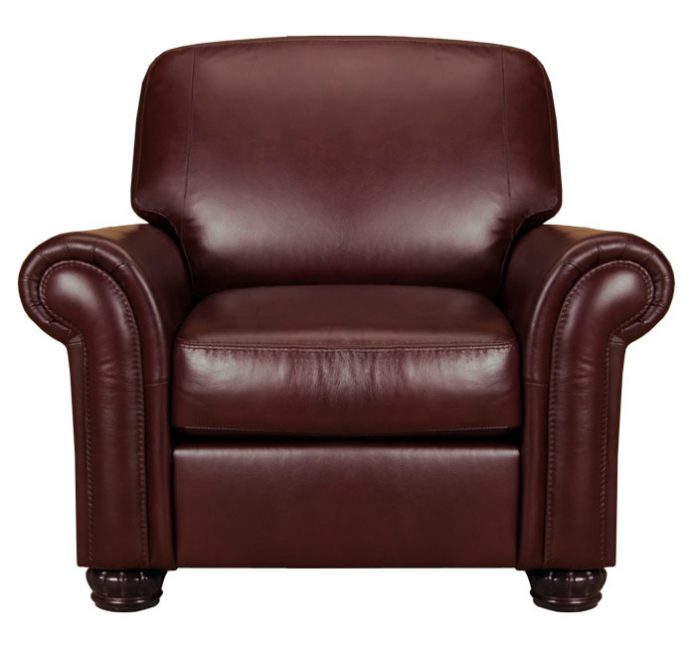Q: My husband finally agreed to give up his completely worn-out, extremely ugly favorite chair if I could find him a nice leather recliner. (Yay! I thought this day would never come.) I’ve been looking, but there are so many choices out there and they vary widely in price. What should I know about leather before purchasing a recliner?
A:
Great question. There’s a lot to know about this product. Many people believe that no manmade material can compare with the natural beauty and feel of genuine leather. It’s generally considered four times more durable than fabric and it doesn’t absorb allergens, pet dander or dust. Enhancing its appeal is the fact that the appearance of many leathers will change and develop a patina over time.
Also of interest, leather is not limited to sofa and chair coverings, but can be incorporated into design accessories such as leather framed mirrors, lampshades, area rugs and even window treatments. But I digress … back to your recliner.
Leather for furniture and other home furnishing products comes from around the world. A majority of hides are produced in Europe – particularly Italy – and South America. The three main categories of leather are summarized here.
ANILINE
This category of leathers is generally considered the finest that money can buy. On average, only five out of every 100 hides will end up in this category. Aniline dyeing is the process of soaking the skins in translucent, pure aniline dyes, which color without obscuring the natural markings or grain character of the leather. There is no pigmented topcoat added for protection (translation … it will scuff and scratch easily). No mechanical processes are used (such as sanding or buffing) to remove any imperfections on the surface of the hide. Barb wire scars, stretch marks, insect bites and branding iron marks may all be visible on an aniline leather. These imperfections are the “hallmarks of nature” that make each hide distinctive. Aniline hides are typically appreciated for their soft hand and natural appearance which make every piece of aniline leather furniture a unique and authentic work of art.
SEMI-ANILINE
The next prized category of hides is called semi-aniline leathers. These have a more uniform color. Out of every 100 hides, approximately 10 to 15 hides are selected at the tannery for this tanning process. This group of leathers will usually exhibit “some” of the natural markings of the range. Touched up by a process called micropigmentation, these hides give you a combination of the soft feel of aniline leather with the protective benefits of a light finish on the surface.
PROTECTED/PIGMENTED
A third category, called pigmented, coats the leather surface uniformly with an opaque color. This durable process covers most imperfections in the leather, and is very commonly used. As many as 80 out of every 100 hides fall into this category. This is because the markings and blemishes on these hides are so pronounced that heavy buffing of the surface is required to remove them. Protected/pigmented hides also have a clear sealant applied to enhance stain resistance and increase the durability of the pigment.
CARE AND MAINTENANCE
Regardless of the category, all leather requires proper care and maintenance to ensure its beauty and durability. Products developed specifically for the type of leather being purchased will help preserve its natural appearance and texture. Cleaning and conditioning on a regular basis can prevent damage caused by drying as well as oil and dirt build-up, and failure to have a proper maintenance program could result in premature aging of the leather. To obtain a maintenance kit that’s formulated for a certain type of leather, call Leather Solutions International at (866) 875-7446 or visit leathersi.com.
So, to summarize: If you’re looking for a leather that’s more uniform in color, has minimal markings on the surface and a protective topcoat (like the leather on an automobile seat), then protected/pigmented leather may be a good choice. If you prefer a “softer hand” with natural markings and you have the budget to accommodate it, you may opt for a top grain aniline. The choices can be daunting, but understanding them should get you one step closer to finding that perfect recliner and sending your husband’s old chair to that big furniture heaven in the sky.
Janet Cunningham is an interior decorator who lives in Morgan Hill. She is a Decorating Den INTERIORS business owner and enjoys working together with Pamela Ryalls-Boyd. Reach Janet at (408) 478-1095, jg************@***il.com or visit www.decdens.com/jcunningham.










